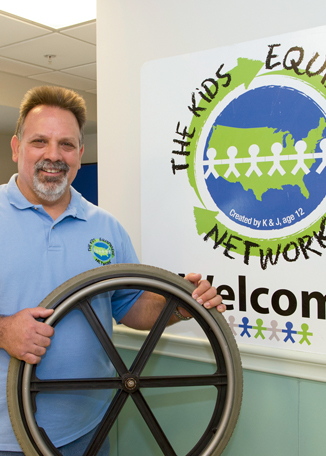
Tim Caruso, BSPT ’82, has always been a tinkerer. He’s the kind of guy who fixed lawnmowers to earn extra money while in school. Since graduating with his physical therapy degree, he’s put his talents to use adapting equipment for children with special needs.
Caruso says he learned the importance of creative problem-solving while at Washington U. “Some days I feel like MacGyver, because much of what we do cannot be found in a textbook,” he says. Looking through a patient’s list of difficulties and abilities, and then figuring a workaround is the essence of his life’s work.
In 2005 Caruso and Lisa Blake, a nurse at Shriners Hospital for Children, where Caruso has worked for decades, founded The Kids Equipment Network (TKEN). The two created the nonprofit in hopes of helping more children get the specific equipment they need to lead a more independent life.
“We take for granted our abilities to sit, walk, use the restroom, ride a bike and play,” Caruso says. Some patients, given their family circumstances, are not aware of the adaptive solutions or equipment available or, if they are, of how to access them. Often, insurance limitations or other red tape stands between a life of limitation and a life of independence.
Neither Caruso nor Blake had run a nonprofit before, and they naturally hit speed bumps along the way: needing to incorporate, obtain liability insurance, fundraise, and secure warehouse space, for starters. Still, they wondered how many children they could help. They aimed for 10 in their first year, yet ended up helping 33. To date, they’ve served nearly 400 children.
“We get to be heroes once a month. We are able to help children in real time, today. We take a lot of never’s and can’t’s out of the world.”
—Tim Caruso, BSPT ’82
TKEN offers monthly equipment clinics that can serve from six to 12 children on a highly individualized basis. Technicians might make a chair’s wheels extra big — fattening up the hand rims so that a youngster can reach the tires and push the chair. Or they might bring its frame down close to the floor, allowing a child to crawl in and out of the chair independently and self-propel it when needed.
Caruso loves TKEN’s real-life impact. “We get to be heroes once a month. We are able to help children in real time, today. We take a lot of never’s and can’t’s out of the world,” he says.
Caruso, however, wants to make equipment far more widely available and has ideas on how to do that by bringing down costs. TKEN recycles and refurbishes gently used equipment in a dramatically cost-efficient manner. One of Caruso’s aspirations is for government to tap into this economy.
“Instead of buying an $8,000 brand-new wheelchair for one child, why don’t you let us provide a refurbished one for only $1,000 to $2,000 and help eight children?” Caruso asks.
Running TKEN, Caruso discovered a talent for what he calls “tapping into the greater good.” Except for a recently added administrative assistant — who, courtesy of a Bank of America grant, helps coordinate logistics — the organization is 100 percent volunteer-based. Caruso inspires lots of assistance: A local restaurateur holds fundraisers that pay for the organization’s liability insurance. Durable medical equipment vendors and manufacturers provide parts and equipment, and other companies donate warehouse space for storing equipment. Technicians “able to turn a wrench better and faster than I do,” according to Caruso, give of their time and talent. Therapists provide hands-on expertise to fit the child into a newly customized piece of adapted equipment.
Leading TKEN is a full-time job, but Caruso manages to do it and work three paying ones as well. And he is the father of two girls, who he says are busier than he is.
He dreams of having an endowment to assure the charity’s ongoing efforts, adding an operations manager and a building for storage and workshops. And he’d like to partner with larger organizations to increase TKEN’s reach. He’s already worked with two other alumni, Donna Hutchinson, BSPT ’81, and Jo Ann Roberts, BSPT ’81, with their efforts in Haiti. TKEN sent a container of durable medical equipment to Global Therapy Group shortly after the earthquake.
Meanwhile, TKEN just applied for a grant to buy $25,000 worth of adaptive strollers. Running close to $3,000, they are cost-prohibitive for most families and not covered by most insurance. An adaptive stroller can be stowed in the family vehicle and can mean the difference between going out and staying home. Caruso wants no child to be left behind because a vital piece of equipment is out of reach.
Sheila Callahan is a freelance writer based in Larchmont, N.Y.
Comments and respectful dialogue are encouraged, but content will be moderated. Please, no personal attacks, obscenity or profanity, selling of commercial products, or endorsements of political candidates or positions. We reserve the right to remove any inappropriate comments. We also cannot address individual medical concerns or provide medical advice in this forum.